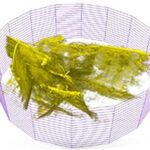Author
Team examines operating limits in solid-state batteries to improve driving range of electric vehicles
Nov. 18, 2020—There is huge momentum toward adoption of battery electric vehicles primarily because performances are meeting or exceeding the properties of traditional automobiles. Consumers want electric vehicles that have similar driving range (energy density) and charging styles and times (power density) to gasoline powered vehicles. Kelsey Hatzell “One pathway to improving the energy density of the battery, or...
Virtual Tours Just Released
Oct. 26, 2020— VINSE is pleased to announce virtual tours are now available for our Analytical Lab and Cleanroom. Analytical Lab Tour Cleanroom Tour
NSF seed grant supports biomanufacturing of new drug delivery technologies
Oct. 21, 2020—One of the challenges of drug delivery systems is to optimize their targeting properties so therapeutic compounds used in smaller amounts reach only a specific area of the body and result in little or no side effects. The ability to engineer the content of extracellular vesicles and target these EVs to specific sites offers the...
VINSE has established an exciting new partnership with EV Biologics
Oct. 1, 2020—CHEYENNE, WY / ACCESSWIRE / September 29, 2020 / EV Biologics, Inc. formerly Yulong Eco-Materials Limited (OTC PINK:YECO) today announced that it intends to utilize the advanced instrumentation and research staff at the Vanderbilt Institute of Nanoscale Science and Engineering (VINSE) and the Vanderbilt Center for Structural Biology (CSB) in the development of extracellular vesicle (EV)-based...
James E. Crowe Awarded the Earl Sutherland Prize for Achievement in Research
Sep. 29, 2020—The Earl Sutherland Prize for Achievement in Research is Vanderbilt’s most prestigious faculty honor for achievement in research. This award honors a faculty member who has garnered significant critical recognition on a national or global scale. The award is accompanied by a cash prize of $10,000 and an engraved pewter julep cup. The winner’s name is added...
VINSE is hiring hourly undergraduate laboratory assistants
Sep. 28, 2020—VINSE is hiring undergraduates to work with staff inside the VINSE cleanroom as lab assistants also known as VINSE Tech Crew. The tech crew will work on projects and activities critical to our daily operations and expand the process capabilities and knowledge base available to our researchers. VINSE is also taking applications for the 10-week...
Engineers develop better graphene sieve that could advance clean water efforts
Sep. 23, 2020—Developing atomically thin graphene membranes used to separate salt from water is extraordinarily complex and the effort grows more crucial as population growth, industrialization and climate change strain freshwater resources. Vanderbilt engineers have designed a simple defect-sealing technique to correct variations in pore size in graphene membranes. Vanderbilt engineering researchers report a breakthrough in scalable...
VINSE Fall 2020 Newsletter
Sep. 15, 2020—You will find the following topics covered in this edition: Director’s note New tool capabilities Video content All upcoming events, including the NanoDay! Poster Session & social media competitions VINSE Fall Newsletter
Cynthia Reinhart-King receives 2020 Chancellor’s Award for Research
Sep. 9, 2020—Cynthia Reinhart-King is one of five Vanderbilt professors who received a Chancellor’s Award for Research at the Fall Faculty Assembly Aug. 27, 2020. This award recognizes faculty excellence in works published or presented in the last three calendar years. Honorees each receive a cash prize $2,000 and an engraved pewter julep cup. The annual event took place...
Tiny tweezer developed at Vanderbilt can trap molecules on a nanoscale, creating powerful research capabilities into cancer metastasis, neurodegenerative diseases
Sep. 1, 2020—In 2018, one-half of the Nobel Prize was awarded to Arthur Ashkin, the physicist who developed optical tweezers, the use of a tightly focused laser beam to isolate and move micron-scale objects (the size of red blood cells). Now Justus Ndukaife, assistant professor of electrical engineering at Vanderbilt University, has developed the first-ever opto-thermo-electrohydrodynamic tweezers, optical nanotweezers...










